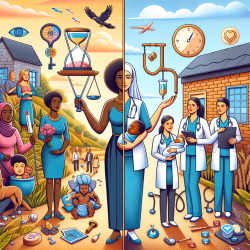Introduction
The aftermath of the September 11th attacks has left a lasting impact on the health of those exposed to the World Trade Center disaster. A recent study, "A qualitative examination of health and health care utilization after the September 11th terror attacks among World Trade Center Health Registry enrollees," reveals critical insights into the barriers faced by individuals in accessing health care services. As practitioners, understanding these barriers can significantly enhance our ability to provide effective care, especially in the realm of online therapy services for children.
Key Findings from the Study
The study utilized focus groups to gather qualitative data from enrollees of the World Trade Center Health Registry. Participants reported a wide range of physical and mental health symptoms but demonstrated limited knowledge and utilization of available 9/11-related health services. The study identified several barriers to accessing care, which can be broadly categorized into:
- Programmatic Barriers: These include a lack of program visibility and accessibility, making it difficult for individuals to seek the necessary care.
- Personal Barriers: Stigmatization, unfamiliarity with 9/11-related health problems, and a lack of referrals from primary care providers were significant obstacles.
- Knowledge Barriers: Many participants were unaware of the connection between their symptoms and the 9/11 events, attributing them instead to aging or other causes.
Implications for Practitioners
For practitioners, especially those involved in online therapy services like TinyEYE, these findings underscore the importance of addressing barriers to care. Here are some actionable steps you can take:
- Enhance Awareness: Increase visibility and accessibility of therapy services through targeted outreach and education. Utilize digital platforms to reach a broader audience.
- Build Strong Referral Networks: Collaborate with primary care providers to facilitate referrals and ensure that patients are aware of available services.
- Address Stigma: Implement strategies to normalize mental health care and reduce the stigma associated with seeking help. Training staff in motivational interviewing can be beneficial.
- Educate on Symptom Attribution: Provide clear information on how symptoms may be related to specific events or exposures, helping individuals make informed decisions about their health care.
Encouraging Further Research
The study highlights the need for ongoing research into the barriers to health care access. Practitioners are encouraged to participate in or support further studies that explore these challenges, particularly in the context of online therapy services. By contributing to the body of research, we can continue to improve care delivery and outcomes for affected populations.
Conclusion
Understanding and addressing the barriers to health care access identified in the World Trade Center Health Registry study is crucial for practitioners. By implementing data-driven strategies, we can enhance the effectiveness of online therapy services and improve outcomes for children and other vulnerable populations. To read the original research paper, please follow this link: A qualitative examination of health and health care utilization after the September 11th terror attacks among World Trade Center Health Registry enrollees.










